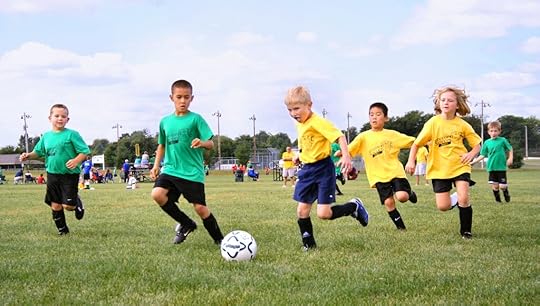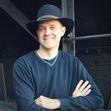Week 3, Day 2: Self as Group Member
“But the people refused to listen to Samuel. “No!” they said. “We want a king over us. Then we will be like all the other nations, with a king to lead us and to go out before us and fight our battles.” When Samuel heard all that the people said, he repeated it before the Lord. The Lord answered, “Listen to them and give them a king.” (1 Samuel 8:19-22)
 Derek Jensen, “Youth Soccer in Indiana,” from Wikimedia Commons
Derek Jensen, “Youth Soccer in Indiana,” from Wikimedia CommonsAs a toddler, we may have a sense of our self as a body, but as we grow older, we come to identify more with groups. This begins to happen in late elementary school and accelerates as we go through puberty. As our brains and bodies change, the opinions and dynamics of our friends come to matter more to us than our primary families. This is a natural part of human development and it’s part of what has kept the human species going over many eons.
Our ancestors survived only by being part of groups. Individual humans are weak and susceptible to predators, but humans in groups could strategically hunt and gather. We could coordinate action in a way that benefitted the tribe. Child-rearing, which is far more labor-intensive for humans than other mammals, was much more successful in a healthy community.
As we grow in other-awareness and group awareness, self-image becomes important to us. We develop the capacity to imagine ourselves through others’ eyes. For some of us, this shift in awareness is profoundly de-centering and traumatic, especially when it involves bullying, rejection, and miseducation into the values of mass culture. Our self-image is wounded; some of us see ourselves through fun-house mirrors, grossly distorted and worried about our bodies, reputations, or social position in a group. This is why so much therapy for trauma focuses on our memories of childhood and adolescence.
But if all goes well and our socialization into larger groups is successful, we may experience rites of passage and a sense of belonging. We may find “chosen family” and friendships that affirm us for our unique skills, values, and strengths. As I’ve heard more than one therapist say, “the best healing of trauma happens in a healthy community.”
Becoming conscious as a human also means becoming conscious of others, recognizing our dependence on the generosity and reciprocity of other human beings. Our self-awareness expands to include our group identities and other identities. Feeling like we belong and that others wish for our well-being is important for our thriving.
And yet as important as this expanding sense of self is to the growth of our consciousness, it can also become an obstacle. Our group is not the whole world. We can get stuck or limited in this self-as-group-member phase, fixated on our belief in the stories we tell ourselves about ourselves or our tribes. We become partisan, cultish, or cliquish. Our consciousness gets co-opted by powerful group stories and we lose an awareness that these are just stories. It can cause people to develop misguided loyalties or compromise their values in order to conform to the group.
Much of the Hebrew Bible is a story about group identity, both its good sides and its bad. God’s message to Israel was often, “You are my special people, but you are not my only special people.”
I talked about optical illusions in the first week, but I want to point out that this sense of self-in-community can become a narrative illusion. Group consciousness and our sense of belonging can be helpful or harmful, depending on the group and how deeply we believe the stories we tell ourselves.
Prayer: God-in-Three, we recognize in you the origins of community. We ask for discernment and wisdom in navigating our different roles and group belonging. Amen.



